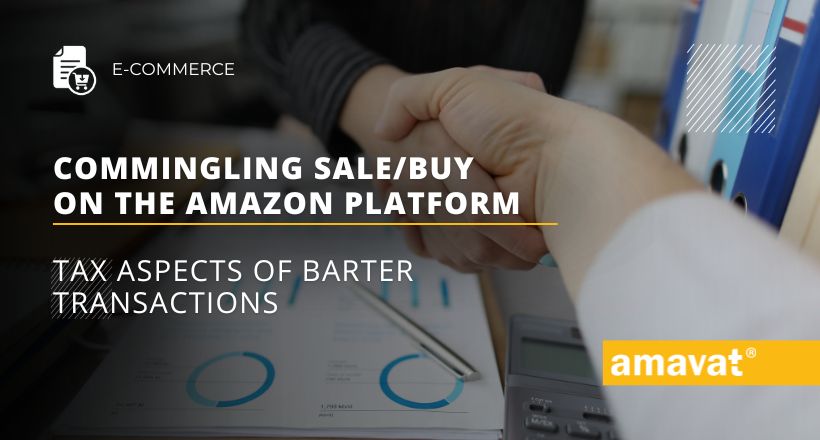Commingling Sale/Buy on the Amazon platform: Tax aspects of barter transactions
Amazon is one of the largest e-commerce platforms globally, providing sellers access to millions of customers. Among the programs Amazon offers to sellers is “commingling.” This article discusses what commingling sale/buy entails, how it works, and its advantages and disadvantages. Additionally, it addresses VAT tax considerations in the context of selling on Amazon.
What is commingling sale on the Amazon platform?
Commingling sale/buy is a program on Amazon where sellers can combine their products with identical items supplied by other sellers. This means that products from different sellers are stored together in Amazon’s warehouses without differentiation by source, and can be interchanged with identical items belonging to Amazon Retail or other FBA sellers participating in the program.
Example of a bartering transaction on Amazon
Consider three different sellers each offering the same book on Amazon. Each sends their copies to an Amazon warehouse. When a customer orders the book, Amazon can fulfill the order using any of the three sellers’ copies. In practice, this speeds up delivery for customers and optimizes Amazon’s logistics processes.
How does bartering work on Amazon?
- Introduction to Amazon Warehouses: Sellers send their products to Amazon warehouses located strategically across Europe, such as in Germany, France, the United Kingdom, Spain, Italy, Poland, and the Czech Republic.
- Product Pooling: Upon arrival at the warehouses, products are pooled together with identical items from other sellers based on the ASIN (Amazon Standard Identification Number).
- Customer Shipping: When a customer orders a product, Amazon ships one of the items available in the warehouse, regardless of its specific seller origin, ensuring consistent quality standards.
Advantages and disadvantages of commingling sale on Amazon
The advantages of the commingling program on Amazon are numerous and can significantly enhance sales efficiency. Primarily, products are shipped from the nearest Amazon warehouse, reducing delivery times. This enables sellers to enhance competitiveness by offering faster order fulfillment, crucial for meeting modern consumer expectations. Another key benefit is warehouse cost optimization. The program simplifies inventory management by treating products from different sellers as a unified inventory, reducing operational complexity and easing inventory management.
However, the program also has its drawbacks that Amazon sellers must consider. First of all, there is a risk related to the quality of the products. If another seller supplies low-quality products, they could end up being delivered to a customer who expects high-quality standards. This can adversely affect a seller’s reputation, leading to negative reviews and returns. Another issue is the risk of counterfeiting. Products eligible for commingling could potentially include counterfeit items, which could significantly harm brand reputation and customer trust, and in the worst-case scenario, result in removal from the Amazon platform.
There are ways to mitigate these risks, though. Sellers can therefore choose which products they consider to be associated with a lower risk of damage or counterfeiting and include only these products in the program. A well-considered strategy is crucial in maximizing performance and minimizing risk.
Commingling sale/buy and tax considerations
Commingling transactions may not impact income tax results directly. They are considered revenue-neutral, meaning they do not generate additional revenues or costs that would affect income tax. However, for VAT reporting purposes, commingling transactions should be reported in pairs—each sale transaction must correspond to a corresponding purchase transaction. This pairing is essential for accurate VAT reporting.
Commingling transactions, both sales and purchases, are subject to various tax procedures depending on the country and the nature of the transaction. In B2B sales, commingling sales may fall under the directive of November 28, 2006, concerning the common system of value-added tax or reverse charge in certain EU countries. In such cases, the buyer may be required to apply local reverse charge procedures and remit VAT to the local tax authority.
Comingling purchases, in turn, may lead to the possibility of deducting VAT charged in other EU countries. However, due to differences in VAT rates across countries, it is necessary to account for these variations when conducting commingling transactions.
Due to the complexity of tax procedures associated with commingling transactions across different EU countries, consulting a tax advisor is recommended. A tax advisor can help understand and correctly apply tax regulations to ensure compliance and avoid potential financial or legal consequences.
Responding to these needs, amavat® offers services that may serve as an ideal solution for companies seeking personalized tax compliance support. We provide dedicated client support, allowing direct contact with professionals familiar with specific needs and tax challenges. Additionally, we offer local language support, crucial for effective communication with local tax authorities across European countries. Combined with the support of local advisors within European countries, amavat® provides comprehensive and personalized tax services, essential for companies operating in international e-commerce markets.
Contact our experts via our contact form for further information.
Summary
The Commingling program on the Amazon platform offers sellers numerous benefits that can significantly enhance operational efficiency. Primarily, the program enables substantial reductions in order fulfillment times, enhancing sellers’ competitiveness in the e-commerce market. Additionally, it supports sales growth and business development by optimizing warehouse costs and increasing product availability for customers. However, introducing commingling transactions also involves various tax considerations, which can be complex, especially concerning international sales on the Amazon platform. Therefore, it is crucial to understand tax regulations in individual countries and consult with a tax expert to ensure compliance with regulations and avoid potential financial or legal consequences.





